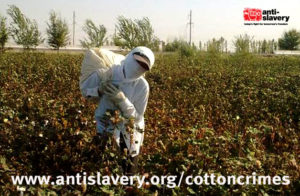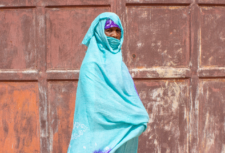Disclaimer: This article is more than 8 years old, and may not include the most up-to-date information or statistics. Please verify information with more recent sources as needed, and if you have any questions contact our Press Office.
27 July 2015
Press release
U.S. decisions on Uzbekistan and Turkmenistan in Trafficking in Persons report supports state-sponsored forced labour and fails victims.

UZBEKISTAN
The U.S. government upgraded the Uzbek government’s ranking in its 2015 Trafficking in Persons Report despite noting that “government-compelled forced labour of adults remains endemic.” The unwarranted decision decreases pressure on the authorities in Tashkent to end forced labour, said the Cotton Campaign in a letter to Secretary of State John Kerry.
“The failure to classify Uzbekistan properly is wholly inconsistent with the well-documented evidence of its systematic human rights abuse,” said Nadejda Ataeva, president at the Association for Human Rights in Central Asia. “The U.S. effectively sent a message to Uzbek authorities that forced labour of millions of its citizens is cost-free.”
The Uzbek government continues to operate one of the largest state-orchestrated systems of forced labour in the world. Furthermore, authorities suppress any attempts by citizens to report on these abuses and continue to publicly deny the use of forced labour.
In 2014, the government forced more than a million citizens to harvest cotton and farmers to grow cotton, all under threat of penalty. In only the first half of this year, the Uzbek government forced thousands of citizens to prepare cotton fields for planting, brutalized citizens attempting to document forced labour and deported an international labour expert simply for informing a legally registered human rights group about international labour conventions.
The TIP report cites a government decree reiterating its pre-existing law prohibiting child labour, fined school directors and farmers for child labour, and signed an agreement with the International Labour Organization. The report notes, however, that officials resorted to child labour “under pressure to fulfil government-decreed cotton quotas,” and forced labour is unlike human trafficking in other countries in that it is “government-compelled.” While a system of state-organized forced labour remains in place, the Uzbek government’s commitments and selective actions on child labour cannot be said to represent substantial efforts to comply with the Trafficking Victims Protection Act minimum standards.
In its letter, the Cotton Campaign called on the U.S. to redouble its efforts to persuade the authorities in Tashkent to eliminate forced labour from the cotton sector. In particular, the United States should insist that the Uzbek authorities begin by instructing officials at all levels of government to refrain from using coercion to mobilize citizens to work in the cotton fields and prosecuting all officials who do; committing to an action plan to eradicate forced labour with the International Labour Organization; and permitting citizens and journalists, domestic and foreign, to report human rights violations in the cotton sector without fear of retaliation.
“The practice of forced labour in Uzbekistan has persisted for far too long and should be urgently ended,” said Umida Niyazova, director at the Uzbek-German Forum for Human Rights. “This year’s report missed a crucial opportunity to end this abominable practice sooner.”
Klara Skrivankova, Europe Programme and Advocacy Co-ordinator at Anti-Slavery International said: “It is difficult to see why the US government decided to upgrade Uzbekistan when year on year Uzbek government forces its people out in the fields and not much changes. If anything, more people were affected than in previous years”.
TURKMENISTAN
The government of Turkmenistan uses widespread and systematic forced labor to produce cotton and deserves to be in the lowest category of the Trafficking in Persons (TIP) Report, said the Cotton Campaign in a letter to the U.S. State Department. The decision to place Turkmenistan in a higher category only serves to perpetuate the abuse, the letter stated.
A new report by Alternative Turkmenistan News (ATN) documented the Turkmen government’s mobilization of tens of thousands of citizens, mainly civil servants and all under threat of punishment, to pick cotton. Authorities also force farmers to meet annual production quotas. Furthermore, the report presents evidence of state-orchestrated forced labor for street cleaning, landscaping and domestic work in public officials’ homes. The Turkmen government’s denial of freedom of expression has obliged monitors to report on its use of forced labor from outside the country.
“The Turkmen government has maintained a dark cloud of secrecy over its human rights abuses for far too long,” said Ruslan Myatiev, editor at Alternative Turkmenistan News. “Turkmenistan may be a small country, but it is the world’s seventh-largest cotton exporter and manufactures garments in-country for major Western brands. It is time the United States increased its pressure on Ashgabat to end its facilitation of human trafficking.”
The United States should make clear to Turkmenistan that ceasing forced labor in the cotton sector and permitting its citizens to monitor for labor rights violations without fear of retaliation are minimum steps to avoid a downgrade in 2016.
***
Note to Editors:
The Cotton Campaign is a global coalition of labour, human rights, investor and business organizations coalesced to end forced labour of children and adults in the cotton sector of Uzbekistan. Anti-Slavery International is a member of the coalition.
For more information, please contact:
In Paris, for the Association for Human Rights in Central Asia, Nadejda Atayeva, +33-617461963, asiecentrale@neuf.fr (Uzbek, Russian, French).
In Berlin, for Uzbek-German Forum for Human Rights, Umida Niyazova, +49 1763-1202474, umida.niyazova@uzbekgermanforum.org (English, Russian, Uzbek).
In New York, for the Cotton Campaign, Matthew Fischer-Daly (English, Spanish): +1-347-266-1351; or cottoncampaigncoordinator@gmail.com.
In London, for Anti-Slavery International, Jakub Sobik: 07789 936 383; or j.sobik@antislavery.org.





